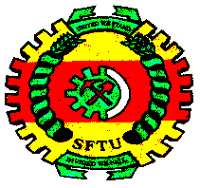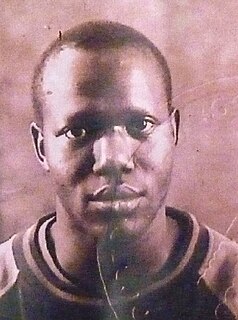
Eswatini, officially the Kingdom of Eswatini and also known as Swaziland, is a landlocked country in Southern Africa. It is bordered by Mozambique to its northeast and South Africa to its north, west, and south. At no more than 200 kilometres (120 mi) north to south and 130 kilometres (81 mi) east to west, Eswatini is one of the smallest countries in Africa; despite this, its climate and topography are diverse, ranging from a cool and mountainous highveld to a hot and dry lowveld.

The Umbutfo Eswatini Defence Force (UEDF) is the official armed national military of the Southern African Kingdom of Eswatini. is used primarily during domestic protests, with some border and customs duties; the force has never been involved in a foreign conflict. The army has struggled with high rates of HIV infection. Since measures were put in place the rate is dropping.

The Congress of South African Trade Unions (COSATU) is a trade union federation in South Africa. It was founded in 1985 and is the largest of the country's three main trade union federations, with 21 affiliated trade unions.

The People's United Democratic Movement is the largest opposition political party in Swaziland. It is a pro-democracy socialist party. Formed in 1983 at the University of Swaziland, it is led by Mlungisi Makhanya. The Swazi government has been monitoring PUDEMO closely since it launched the Ulibambe Lingashoni campaign, which aims for a "total liberation" of Swaziland, and has recently cracked down heavily on even small manifestations of support for PUDEMO, such as the death in custody of PUDEMO member Sipho Jele, who was arrested for wearing a PUDEMO t-shirt in May 2010.
Mario Masuku is the leader of the People's United Democratic Movement (PUDEMO), Swaziland's banned opposition party.
Child labour in Eswatini is a controversial issue that affects a large portion of the country's population. Child labour is often seen as a human rights concern because it is "work that deprives children of their childhood, their potential and their dignity, and that is harmful to physical and mental development," as defined by the International Labour Organization (ILO). Additionally, child labour is harmful in that it restricts a child's ability to attend school or receive an education. The ILO recognizes that not all forms of children working are harmful, but this article will focus on the type of child labour that is generally accepted as harmful to the child involved.

The Swaziland Federation of Trade Unions (SFTU) was a national trade union center in Swaziland. It was founded in 1983 and dissolved into the Trade Union Congress of Swaziland (TUCOSWA) in 2012.

Mbabane Swallows Football Club is a Swazi football club based in Mbabane.
Jay Naidoo is a South African politician and businessman who served as the founding general secretary of the Congress of South African Trade Unions (COSATU) from 1985 to 1993. He then served as Minister responsible for the Reconstruction and Development Programme in the first post-apartheid cabinet of President Nelson Mandela (1994–1996) and as Minister of Post, Telecommunications, and Broadcasting (1996–1999).

Ebrahim Patel is a South African cabinet minister, who holds the position of Minister of Trade and Inudstry. He previously served as Minister of Economic Development from 2009-2019.

Africa Contact is a Danish NGO, formed in 1978 as South Africa Contact, by a number of political parties, trade unions and other organizations to fight colonialism. The organization initially worked to abolish apartheid in South Africa.
The Swaziland United Democratic Front is a coalition of pro-democracy interests including political parties, unions and churches. The Swaziland United Democratic Front was formed on 2 February 2008 at the Tum’s George Hotel in Manzini, Swaziland, attended by 120 persons from various organizations but mainly from the following:
The Eswatini Democracy Campaign consists of organisations from Eswatini and South Africa that advocate democracy in Eswatini. The campaign supports the democratic initiatives of trade unions, NGOs, student organisations and other organisations that further the cause of democratization in Eswatini. The campaign calls upon the South African government and those of other SADC countries to acknowledge that they are in effect protecting the undemocratic and repressive Eswatini regime. The campaign seeks the removal of restrictions on political parties, the news media and political gatherings, and calls for free, multi-party elections.
Vincent Ncongwane, born 19 April 1962, South Africa, is the former secretary general of the Swaziland United Democratic Front and the acting secretary general of the Swaziland Federation of Labour and the Swaziland Union of Financial Institutions and Allied Workers.

Sipho Jele was a member of the banned Swazi political party People's United Democratic Movement (Pudemo) as well as the Swaziland Agricultural and Plantations Workers Union (SAPWU), part of the Swaziland Federation of Trade Unions (SFTU). He died in police custody in Swaziland, after having been arrested on 1 May 2010, at the SFTU May Day celebrations, for having worn a T-shirt with a Pudemo logo. Sipho Jele was found hanging from the rafters of a toilet at the Sidvwashini Correctional facility where he was being held on 4 May.
Pius Vilakati is a Swazi democracy activist, as well as being the former President of the University of Swaziland Student Representative Council (SRC) and a former prominent member of the Swaziland National Union of Students (SNUS).
Eswatini for Positive Living (ESWAPOL) is a Swazi NGO that was formed in 2001 by Siphiwe Hlophe and four other HIV-positive women. SWAPOL provides counselling and education, and seeks to improve the living conditions of people who are affected by or infected with HIV in the rural areas, many of whom are women. The organisation has over 1000 members, mostly women, and is highly active in e.g. challenging the policies of the Swazi government on its AIDS and Women's Rights policies.

Maxwell Dlamini is the Secretary General of SWAYOCO and the former President of the University of Swaziland Students Representative Council. During the so-called "April 12 Swazi Uprising" in April 2011, he and fellow activist Musa Ngubeni were arrested on charges of possession of explosives under Sections 8 and 9 of Swaziland’s Explosives Act 4 of 1961. They were both allegedly tortured and were subsequently refused bail. They were imprisoned at the Manzini Remand Centre.
Wonder Mkhonza is a national leader of the banned political party in Swaziland, the People's United Democratic Movement (PUDEMO). He was elected the National Organising Secretary at PUDEMO's 2011 congress. Prior to this position he was the Deputy Secretary General, a position he held till the last congress. He has served PUDEMO in various levels including chairperson of Nhlangano Branch of PUDEMO, Chairperson of the Shiselweni Region of PUDEMO, which is also the home region of the President Mario Masuku. Mkhonza also sits in the National Disciplinary Committee of PUDEMO.
DITSELA, or the DITSELA Workers' Education Institute is a union education organisation in South Africa. It was founded in 1996 by two of the then-largest union federations in South Africa, the Federation of Unions of South Africa (FEDUSA) and the Congress of South African Trade Unions (COSATU)to help build a strong trade union movement. It was subsequently joined by the National Council of Trade Unions (NACTU). It has offices in Johannesburg and Cape Town. The acronym is a pun: ditsela also means 'pathways' in Sesotho, leading to the institute's slogan of 'Pathways to a Strong Labour Movement'. It was intended to consolidate the existing union education programmes, and help the unions develop their own education programmes. It was described in 2007 by an International Labour Organization as the 'largest union education institute in Africa'. Its main funder, however, is not the unions but the state.









